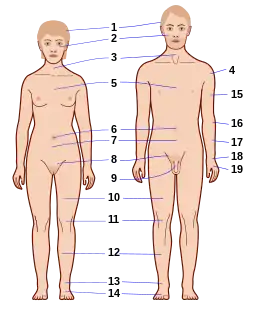zarna
Latvian
| Picture dictionary | ||
|---|---|---|
| ||
|
Etymology
From Proto-Baltic *žer-, *žar- (with an extra suffix *-nā), from Proto-Indo-European *ǵʰer- (“bowel, intestine”). In the 17th and 18th centuries, several variants of this stem are attested: zarnis, zarns, sarna. Cognates include Lithuanian žárna, žarnà, Old Norse gǫrn, Old High German, Middle Low German garn (“yarn”), German Garn (“yarn”), Albanian zorrë (“intestine”), Sanskrit हिरः (hiraḥ, “tape, stripe”), हिरा (hirā, “vein”), Ancient Greek χορδή (khordḗ), Latin haruspex (“diviner who reads the intestines of sacrificed animals”).[1]
Pronunciation
- IPA(key): [zâɾna]
Noun
zarna f (4th declension)
- (anatomy, often plural) intestine, bowel (part of the digestive tract between the stomach and the anus)
- zarnu trakts ― intestinal tract
- zarnu sieniņa ― intestinal wall
- tievā zarna ― small (lit. thin) intestine
- resnā zarna ― colon (lit. fat intestine)
- taisnā zarna ― rectum (lit. straight intestine)
- zarnu darbība ― bowel movement (lit. intestine activity)
- zarnu slimības ― intestinal diseases
- zarnu iekaisums ― intestinal inflammation
- zarnu parazīti ― intestinal parasites
Declension
Declension of zarna (4th declension)
References
- Karulis, Konstantīns (1992), “zarna”, in Latviešu Etimoloģijas Vārdnīca (in Latvian), Rīga: AVOTS, →ISBN
This article is issued from Wiktionary. The text is licensed under Creative Commons - Attribution - Sharealike. Additional terms may apply for the media files.


